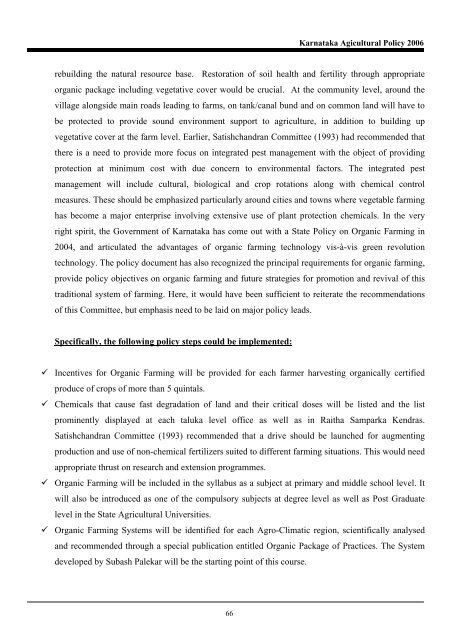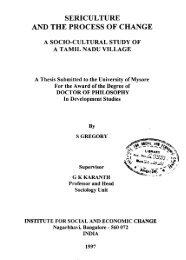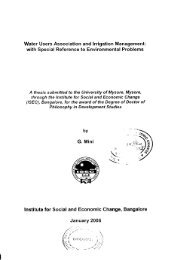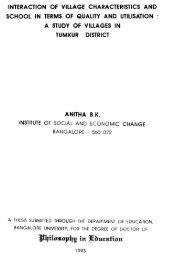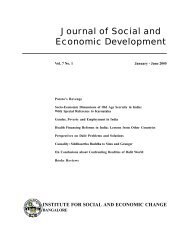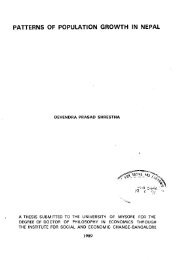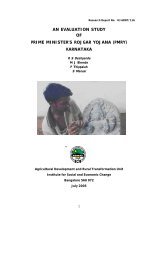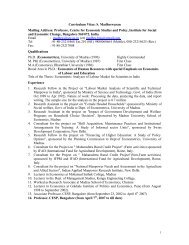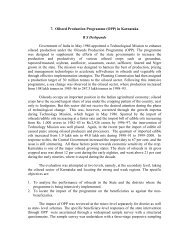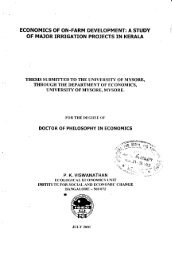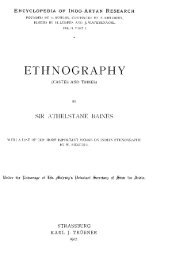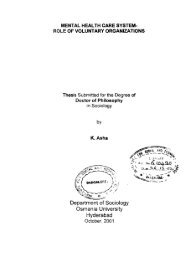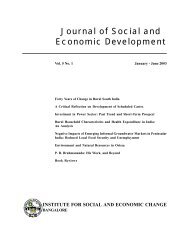Karnataka Agricultural Policy - Institute for Social and Economic ...
Karnataka Agricultural Policy - Institute for Social and Economic ...
Karnataka Agricultural Policy - Institute for Social and Economic ...
Create successful ePaper yourself
Turn your PDF publications into a flip-book with our unique Google optimized e-Paper software.
<strong>Karnataka</strong> Agicultural <strong>Policy</strong> 2006<br />
rebuilding the natural resource base. Restoration of soil health <strong>and</strong> fertility through appropriate<br />
organic package including vegetative cover would be crucial. At the community level, around the<br />
village alongside main roads leading to farms, on tank/canal bund <strong>and</strong> on common l<strong>and</strong> will have to<br />
be protected to provide sound environment support to agriculture, in addition to building up<br />
vegetative cover at the farm level. Earlier, Satishch<strong>and</strong>ran Committee (1993) had recommended that<br />
there is a need to provide more focus on integrated pest management with the object of providing<br />
protection at minimum cost with due concern to environmental factors. The integrated pest<br />
management will include cultural, biological <strong>and</strong> crop rotations along with chemical control<br />
measures. These should be emphasized particularly around cities <strong>and</strong> towns where vegetable farming<br />
has become a major enterprise involving extensive use of plant protection chemicals. In the very<br />
right spirit, the Government of <strong>Karnataka</strong> has come out with a State <strong>Policy</strong> on Organic Farming in<br />
2004, <strong>and</strong> articulated the advantages of organic farming technology vis-à-vis green revolution<br />
technology. The policy document has also recognized the principal requirements <strong>for</strong> organic farming,<br />
provide policy objectives on organic farming <strong>and</strong> future strategies <strong>for</strong> promotion <strong>and</strong> revival of this<br />
traditional system of farming. Here, it would have been sufficient to reiterate the recommendations<br />
of this Committee, but emphasis need to be laid on major policy leads.<br />
Specifically, the following policy steps could be implemented:<br />
Incentives <strong>for</strong> Organic Farming will be provided <strong>for</strong> each farmer harvesting organically certified<br />
produce of crops of more than 5 quintals.<br />
Chemicals that cause fast degradation of l<strong>and</strong> <strong>and</strong> their critical doses will be listed <strong>and</strong> the list<br />
prominently displayed at each taluka level office as well as in Raitha Samparka Kendras.<br />
Satishch<strong>and</strong>ran Committee (1993) recommended that a drive should be launched <strong>for</strong> augmenting<br />
production <strong>and</strong> use of non-chemical fertilizers suited to different farming situations. This would need<br />
appropriate thrust on research <strong>and</strong> extension programmes.<br />
Organic Farming will be included in the syllabus as a subject at primary <strong>and</strong> middle school level. It<br />
will also be introduced as one of the compulsory subjects at degree level as well as Post Graduate<br />
level in the State <strong>Agricultural</strong> Universities.<br />
Organic Farming Systems will be identified <strong>for</strong> each Agro-Climatic region, scientifically analysed<br />
<strong>and</strong> recommended through a special publication entitled Organic Package of Practices. The System<br />
developed by Subash Palekar will be the starting point of this course.<br />
66


